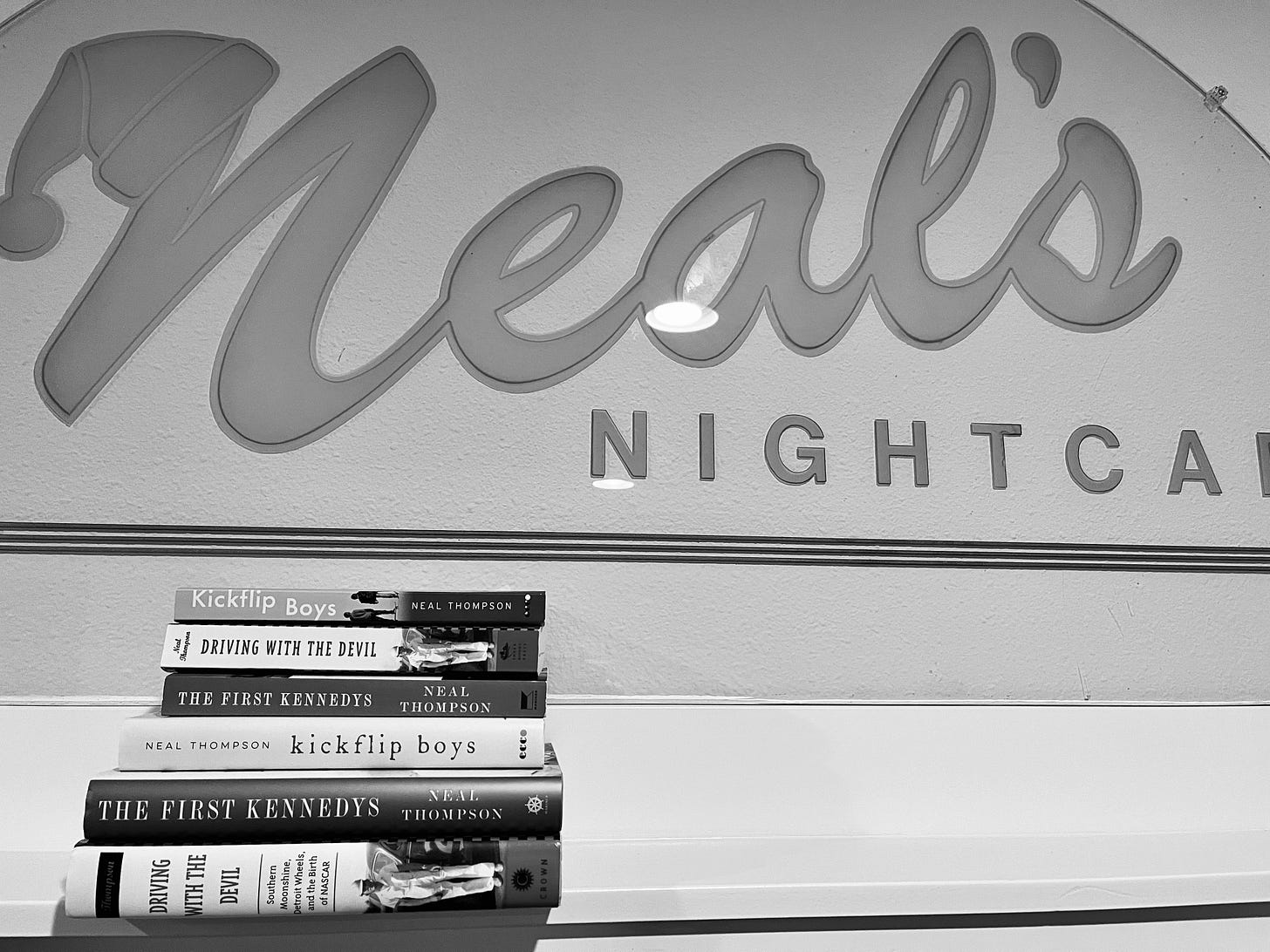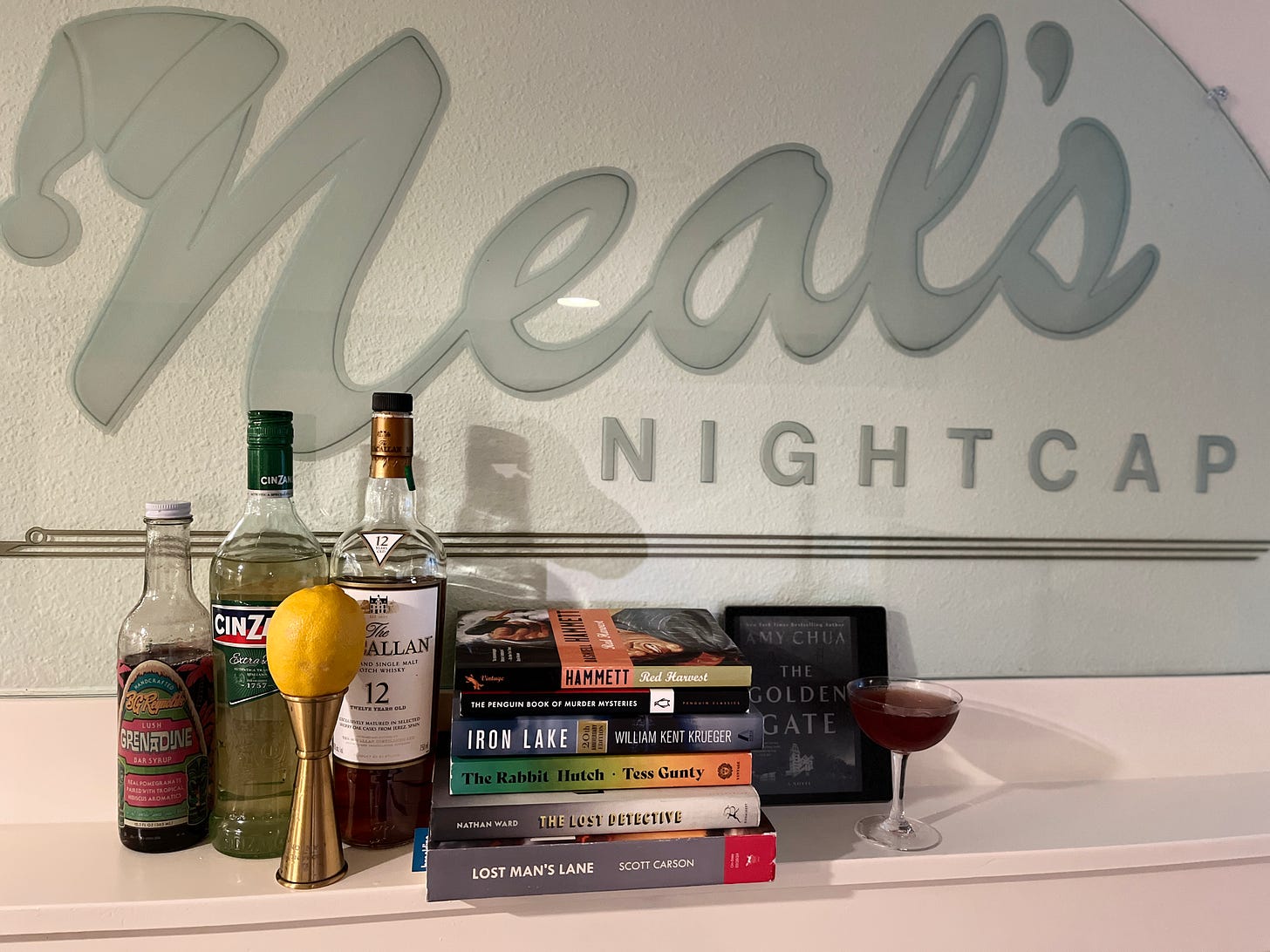Blood & Whiskey #33
Dashiell Hammett, Sam Spade, and the Scofflaw cocktail; Amy Chua's gritty murder mystery, The Golden Gate; William Kent Krueger's Cork O'Connor; and me...
Hello friends and readers,
I don’t say too much about my own books in this space. I’m like a parent who brags about other parents’ kids. But my offspring have been on my mind lately, so indulge me…. This week is the 1-year paperback birthday and 2-year hardcover birthday of my sixth book, The First Kennedys: The Humble Roots of an American Dynasty. Also this week, I received a first-ever royalty check for my second book: Driving With the Devil: Southern Moonshine, Detroit Wheels, and the Birth of NASCAR. That book came out nearly 18 years ago and still sells a few hundred copies a year. The royalty check (tiny, but cute) means my publisher has recouped the $ they fronted me (the “advance”) and I have “earned out.” Only one other book has reached earned-out status (the rest may never), so it’s a nice mini-milestone to celebrate (with a Cocktail of the Month, see below). Also, I’m now in the process of working with my agent to pitch book #7 to publishers — or, as I like to think of it, sticking my finger in an electrical socket once again, and hoping for a different result. More on that soon, I hope.
But there’s another reason for all this me, me, me…
The Golden Gate, by Amy Chua — Chua is best known (at least by me) for her 2011 book, Battle Hymn of a Tiger Mother, about raising her daughters in the strict “Chinese way.” Back to me: in my 2018 book Kickflip Boys: A Memoir of Freedom, Rebellion and the Chaos of Fatherhood, I described Chua’s Tiger Mom as a guilt-inducing taunt to our free-range parenting approach with our sons.
The Golden Gate is her debut novel and it’s surprisingly good. Set in Berkeley, CA in 1944, it’s the story of the murder of Walter Wilkinson, a presidential candidate (based loosely on Wendell Willkie) and lover of China's First Lady, Madame Chiang Kai-Shek, who has a place in Berkeley. Wilkinson is shot one night at the Claremont Hotel, where ten years earlier the daughter of a wealthy San Francisco family had died. On the case is Homicide Detective Al Sullivan, a Mexican American cop with a mysterious past. In Chua’s hands he’s a bit of Sam Spade, but she treats it all with a knowing wink at the tropes of the genre.
Lots of entertaining historical asides and backstories: about otters, the Lincoln Highway, forensic policing, Japanese internment, San Francisco’s Chinatown, California’s Native tribes. She’s also flirty and funny. One dumb-ass cop “fell out of the stupid tree and hit every branch on the way down.” There’s plenty of cigarette smoke and whiskey, also some fun lines. A lodge full of taxidermy is “like a cathedral where the gods were animal carcasses.” A fancy living room “smelled like gin, orchids, and expensive carpets.” Good dialogue, too — including this easter-egg nod to the Tiger Mom: “Why didn’t some expert — like maybe a doctor — write a book teaching people the best way to raise a kid?”
I put The Golden Gate in the category: didn’t expect to like it, it grew on me, and I’m glad I stuck with it. The reverse of that experience was The Fury by Alex Michaelides, whose bestseller The Silent Patient has been on my TBR list for ages. The premise seemed solid: murder on a Greek island. Except… it’s narrated by annoying Elliot Chase, pal of the ex-movie star who invited him to her island, who was there the night of the murder and promises “a story unlike any you've ever heard.” Except… his slowwww recounting of the night’s events grated on me, as did his tone. Aiming for chummy — “you and I should be sitting together on a couple of barstools right now” and “I’m a sly one, aren’t I?” and “where was I? forgive me…” (ugh) — our narrator comes off as trite, sneaky, cloying. Not for me, so I gave up halfway through. (After wondering “am I missing something here?” I was relieved to read the New York Times’ critical review.)
But here’s one I loved: Iron Lake, by William Kent Krueger.
Published more than 20 years ago, it’s the first in Krueger’s long-running series featuring Cork O’Connor, a part Irish, part Native former Chicago cop sleuthing in small town northwoods Minnesota. I know it’s lazy to quote blurbs, but this one sums it up nicely: “one part James Ellroy, one part Stephen King, one part Jack London.” When we meet Cork, he’s the ex-sheriff, having stepped down after an unfortunate shooting. His marriage to lawyer Nancy Jo is on the rocks, so he’s living in a dead friend’s Quonset hut and sleeping with a beautiful waitress with a rumored reputation. Everyone knows everyone in the town of Aurora and surrounding Tamarack County. Often they’re related. But even here the racial and economic lines are drawn in bold. On one side: developers, casino owners, and lawyers; on the other: casino workers, ice fishers, and the just-getting-by. Cork straddles multiple worlds (racial and economic) but doesn’t seem to fit comfortably in any of them. The gist of the story is the apparent suicide of a wealthy judge, and the disappearance of a kid who found the body. But the real story is the people of this beautiful but wounded remote corner of America.
I loved the mood of it: chilly, snowy, icy, bloody. The characters are real, the bad guys bad, the violence sharp, and the ice on Iron Lake thick enough for a car chase — except for that spot where it’s not. Looking forward to getting to know Cork better as I read deeper into the series, which is now 20 books strong.
Next, three nods to Dashiell Hammett…
For the past year I’ve been writing scripts for the American History Tellers podcast (see playlist below). I’m currently drafting a 3-part series on the Pinkerton Detective Agency. Dashiell Hammett spent a few years as a Pinkerton agent before launching his writing career. This led me to finally reading Hammett’s classic first novel, Red Harvest, which was inspired by his time as a Pinkerton. The hard-boiled, unnamed “Continental Op” drinks and shoots his way through the corrupt and violent town of Personville (pronounced Poisonville in gangster-speak — like shoit for shirt). Full of ice picks, pipe bombs, whiskey explosions, car chases, juke joints, and tough-talkin’ dames, it’s a hoot. And the names are pure noir poetry, like from a Tom Waits song: Reno Starkey, Lew Yard, Pete the Finn, Whisper, the Op, a bunch of lungers, bulls, and muckers and “a little lame guy called Step-and-a-Half.” Also perfect little moments of gloom to go with a body count to rival John Wick: “Day was still a little way off. The street was the color of smoke. My feet made a lot of noise on the pavement.”
We just finished watching the TV series Monsieur Spade, written and directed by Frank Scott (recently profiled in The New Yorker). Clive Owen is a better-then-expected Sam Spade, now semi-retired in southern France (with a terrible French accent). The show was a blast, with the snappiest dialogue and an odd but hilarious final-episode cameo by Alfre Woodard.
Hammett pops up everywhere… I’m reading a fantastic new book by “Scott Carson” (aka Michael Koryta), about a 16-year-old kid who spends a summer working for a PI in Bloomington, Indiana. The kid’s boss introduces him to Hammett’s unnamed operative employed by the Continental Detective Agency, so the kid reads a collection of Hammett’s “Continental Op” stories. His boss then becomes the Indiana Op. (More on that book next month.)
Tidbits…
Also reading: The Rabbit Hutch, by Tess Gunty; The Penguin Book of Murder Mysteries (X-mas gift from wifey, with obscure stories from around the globe); The Lost Detective: Becoming Dashiell Hammett, by Nathan Ward.
Up next (all publishing in March): Lost Man’s Lane, by Scott Carson (Michael Koryta); Blessed Water, by Margot Douaihy; The Havana Run, an Amazon Original short story by Ace Atkins; #Panic, by
, who wrote the trilogy that became the TV series Killing Eve, and who’s now writing a serialized new Killing Eve: Resurrection novel here on Substack.Here’s a great piece by S.A. Cosby on the impact crime novelist Chester Himes has had on his work, in the New York Times.
And a horror story: According to an Economist/YouGov poll about America’s reading habits, nearly half of U.S. adults read ZERO books in 2023 (46%); 33% read five and 5% read just one. Those (like me) who read a book a week-ish? Top 1%. Hit the Washington Post to read the full story (and weep).
Cocktail of the Month
Keeping with the Dashiell Hammett theme… In Red Harvest, the Continental Op is never far from a drink — usually with Dinah Brand, often just gin, lemon, ice. (“I tried to laugh with her while I kept my head above the gin I had guzzled” and “At forty I could get along on gin as a substitute for sleep.”) Or sometimes just a shot of Scotch. (“I moved some of the Scotch from my flask to my stomach.”)
Sam Spade is also a Scotch man, but partial to the occasional cocktail. I found a few cocktail tributes to Hammett or Spade, but my favorite was the Prohibition-era drink, the Scofflaw, apparently created in 1924 in Paris. There are various versions out there, but I prefer the one below, which I found via an Instagrammer (@vintagepulps) who found it inside a 1927 issue of the pulp magazine Black Mask featuring Hammett’s story, Poisonville. That was the first installment of a four-part serialization that in 1929 became the book Red Harvest.
The Scofflaw*
2 oz Scotch (you can also use rye)
1 oz. dry vermouth
3/4 oz. lemon juice
3/4 oz. grenadine
2 dashes orange bitters
Combine with ice and shake, then strain into a chilled glass. No garnish.
(*here’s the post on Instagram — tell them Blood & Whiskey sent you):
Playlist of the Month
More me, me, me… Here’s a collection of podcast episodes I’ve been writing.
Most recent = mini profiles of James Baldwin and John Steinbeck (both serious drinkers, btw) for a series on Great American Authors.
Always grateful for comments, questions, likes, shares, etc.
Thanks for reading…
Till next month,
-Neal
Find me @ Instagram; sometimes Facebook, Twitter, LinkedIn, Goodreads







Congrats on the book stuff! Can't wait to see whatever it is you come up with next. :)
As a native Minnesotan, I love WKK's northern MN settings. I've read ~10 of the Cork O'Connor series, as well as all of his standalones. FWIW, I think his standalones are his best work and "Ordinary Grace" remains my favorite.